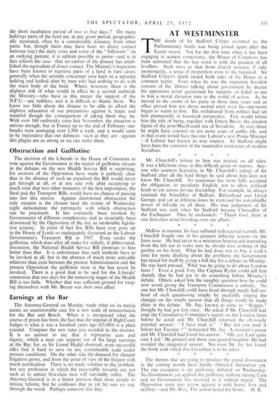Obstruction and Guillotine
The decision of the Liberals in the House of Commons to vote against the Government in the matter of guillotine closure in the debates on the new Health Service Bill is surprising, for sections of the Opposition have made it perfectly clear that in the absence of such an expedient the Bill would never get through at all, or at any rate only after occupying so much time that two other measures of the first importance, the Steel and the Transport Bills, would have no chance of passing into law this session. Against determined obstruction the only weapon is the closure (and the events of Wednesday night demonstrate the pertinacity with which obstruction can be practised). It has constantly been invoked by Governments of different complexions, and as invariably been denounced by the Opposition of the day as intolerable legisla- tive tyranny. In point of fact few Bills have ever gone up to the House of Lords so inadequately discussed as the Labour Government's Transport Bill in 1947. Even under the guillotine, which does after all make for orderly, if abbreviated, discussion, the National Health Service Bill promises to fare better than that. It is unfortunate that such methods have to be invoked at all, but in the absence of much more amicable relations than exist between the present Administration and the present Opposition the guillotine must in the last resort be invoked. There is a good deal to be said for the Liberals' contention that two days for the remaining stages of the Health Bill is too little. Whether that was sufficient ground for rang- ing themselves with Mr. Bevan was their own affair.


































 Previous page
Previous page